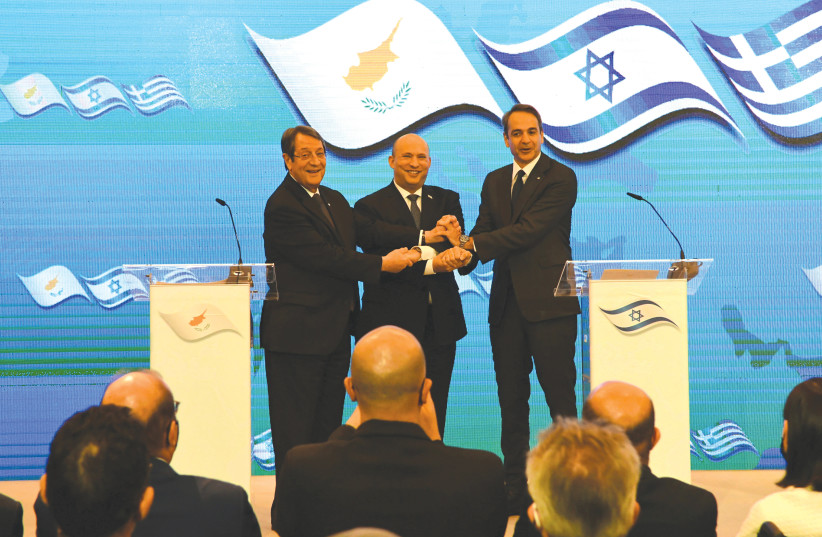Relations between Cyprus and Israel have changed radically in recent years and this is anything but coincidental. Apart from the self-evident convergences of interests between the two sides, it took endless hours of work, both by Israeli and Cypriot diplomats, to cultivate relations of real trust and to overcome obstacles that arose along the way from accidental and rather unfortunate events.
This result was also recorded in a poll conducted recently by the Israeli Embassy in Nicosia, according to which 69% of Cypriots now have a positive view of Israel. When asked how they view the relations that have developed between the two countries, an astonishing 89% of Cypriots said that they view them positively.
What has hindered the development of these relations in the past is a complex issue which certainly deserves a separate analysis. The important thing today is probably not the past but the future. With the decade of President Nicos Anastasiades’s administration coming to an end next February, the question undoubtedly arises as to his successor with regard to these relations.
The leading candidate
Nikos Christodoulides, a former foreign minister, is the big favorite according to all the current polls. During his time in office, relations between Jerusalem and Nicosia received an unprecedented boost. While it would certainly be wrong to credit a much broader and multifaceted relationship to one man alone, the fact remains that he exerted all his influence to achieve this result.
It was at his insistence that Cyprus decided this time last year to boycott the event marking the 20th anniversary of the controversial UN World Conference against Racism in Durban, prompting Athens to do the same a few days later. The participation of the two countries, along with 29 others, in the boycott of the event, which took place on the sidelines of the UN General Assembly, was an unprecedented move for both Cyprus and Greece.

Nicosia, despite its steady rapprochement with Israel, still maintains its friendly relations with the Arab world and the Palestinians, mainly due to its long-standing concern about the movement of Arab and Muslim states toward upgrading the self-declared Turkish Republic of Northern Cyprus.
Greece also measures these balances very carefully, both in relation to bilateral issues with the Arabs and Greek-Turkish relations, as well as other issues of its own, such as the control of the Orthodox Patriarchate of Jerusalem and the maintenance of this control through relations with Jordan.
The contenders
Averof Neophytou, another contender, is the leader of the ruling and largest party, the Democratic Rally, of which Christodoulides is a member. He is also a consistent supporter of deepening Cyprus’ relations with Israel in all areas. His own contribution to the development of these relations in recent years has certainly been very important.
Neophytou maintains a very close, long-standing, friendly relationship with President Isaac Herzog, who last March, out of protocol and while visiting Cyprus, visited Neophytou at his home. Neophytou is clearly seen as a supporter of Atlanticism, and claims to be more flexible when it comes to the Cyprus problem, while Christodoulides and the forces behind him are adopting a firmer stance on it.
The third candidate is Andreas Mavroyiannis, a career diplomat and former negotiator for the Greek Cypriot side in the Cyprus talks, who is running as an independent, having however first secured the support of the second largest party on the island, the left-wing Akel.
Despite its heavy losses in recent years, Akel remains, proportionally, the largest Communist party in the Western world (in the 2021 elections it received 22.34% of the vote, following the Democratic Rally’s 27.7%) and its stance on Israel is clearly influenced by the traditional positions of Communist parties on the Palestinian issue.
It is noteworthy that Akel is a Western-style Communist party with a somewhat peculiar relationship with capitalism, with past scandals of an economic nature. It was under the presidency of its former leader, Demetris Christofias, that the last phase of the upgrade of relations between Cyprus and Israel was launched, even though Nicosia’s motive at that time was mainly natural gas extraction.
In conclusion – and always with a great reservation as to whether the politically right-wing Mavroyiannis would follow Akel’s suggestions in relation to Israel or not – Akel is traditionally the party most clearly critical of Israel. It participates in all manifestations of support for the Palestinians in Cyprus and at the European Parliament, and discreetly refrains sometimes from even condemning the attacks of Palestinian terrorists against Israel. The same hardly applies to any form of retaliation from Israel, which is always heavily criticized by the party.
The Mediterranean triangle
Although Israel has made it clear that its relations with Cyprus will not be affected by the recent restoration of its relations with Turkey, there is a feeling on the island that at some point the interests arising from the complex natural gas situation may be reversed. This is where a flexible stance on the part of Nicosia will be needed in relation to the Cyprus issue, in case this should emerge as an obstacle to the energy landscape in the region.
In this respect, perhaps the choice of the new Cypriot leader will have an added significance in terms of how ready he will be to focus on the big picture without rigidity.
However, with the Cyprus problem at its worst stalemate in decades and with the above scenario only a hypothesis for the time being, Israel-Cyprus relations retain an extremely positive horizon in which both countries are investing, knowing that they have much to gain on all levels. The latter being no longer a mere figure of speech.
The writer is editor-in-chief and daily columnist of the Cypriot newspaper Politis, in Nicosia. He has been working for 30 years as a journalist in various media, as well as a foreign media correspondent.
